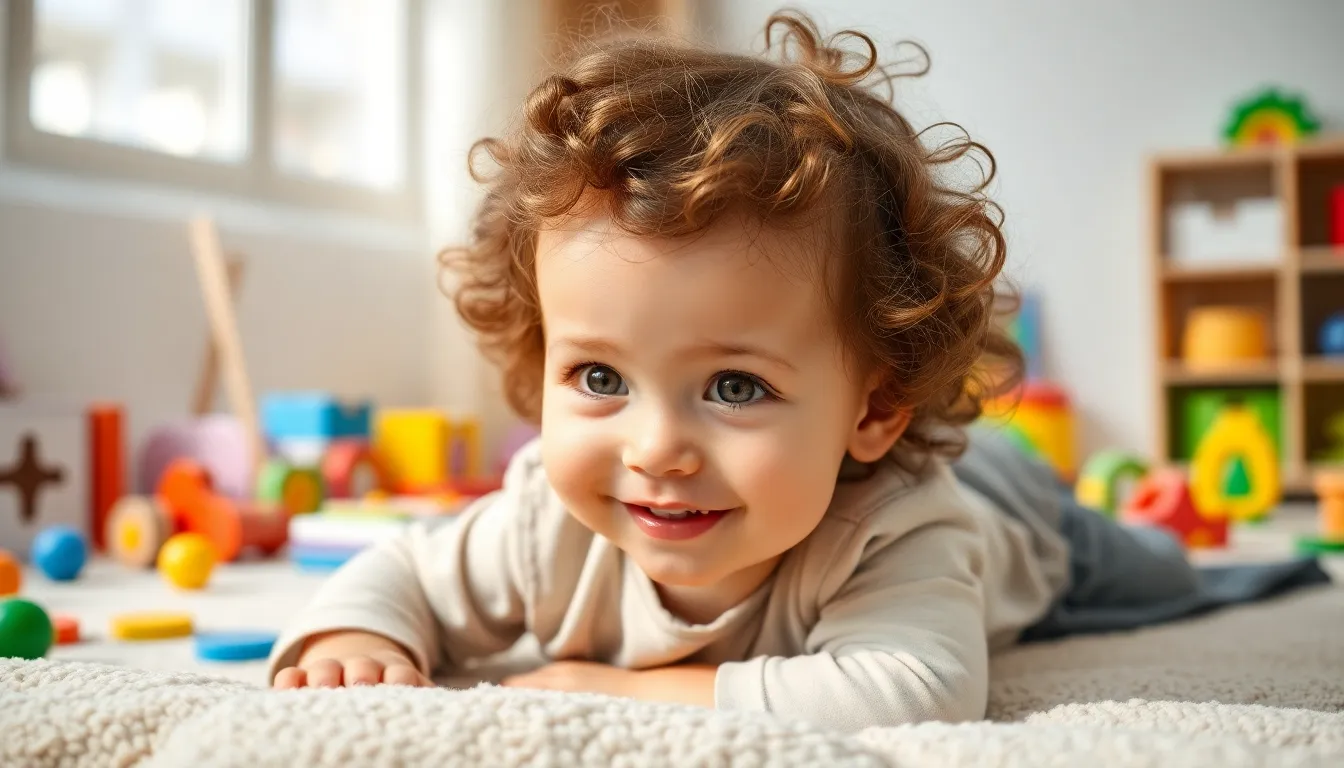Babies have a knack for surprising us, and one of their most puzzling habits is head banging. It might seem alarming at first, but before you panic and call the pediatrician, let’s dive into the curious world of infant behavior. Why do they choose to express themselves through head hits?
Turns out, this quirky action isn’t just a sign of a future rock star in the making. Babies often hit their heads as a way to explore their surroundings, relieve frustration, or simply get your attention. So before you worry that your little one is auditioning for a slapstick comedy, it’s time to uncover the reasons behind this baffling behavior and put your mind at ease.
Table of Contents
ToggleUnderstanding Baby Behavior
Babies express themselves through various behaviors, including head banging. Engaging in this action often serves multiple purposes for infants. Exploration of their bodies and surroundings plays a significant role in their development. When babies hit their heads, they might be testing their strength or spatial awareness.
Developmentally, babies often go through phases of frustration. In moments of irritation, head banging can provide an outlet for those feelings. Seeking attention is another reason that can motivate this behavior. A baby may notice that head banging elicits a response from caregivers, leading to repeated actions.
Sensory stimulation influences baby behavior as well. The sensation of hitting their head can create feelings of pleasure or excitement. Research indicates that repetitive movements, such as head banging, are common in toddlers as they refine motor skills. In some cases, these actions provide comfort, similar to how some children might rock back and forth.
Parents can observe the context in which head banging occurs. Noticing triggers helps in understanding the baby’s needs. When a baby seems distressed or frustrated, this behavior might signal a need for comfort or redirection. Growth and development stages also contribute to the frequency of head banging. As physical and cognitive abilities evolve, this behavior usually diminishes.
Many experts agree that head banging is primarily a normal phase in infant development. Continuous monitoring and gentle redirection can help reassure both baby and parent. Addressing the underlying causes can aid in managing this behavior effectively.
Reasons Babies Hit Their Head

Babies hit their head for various reasons, and understanding these can alleviate parental concerns. Head banging often arises from developmental exploration, emotional expression, and sensory stimulation.
Developmental Exploration
Developmental exploration drives many baby behaviors. Infants often experiment with their bodies and surroundings as they grow. They discover their physical capabilities through actions like head banging. Motor skill refinement plays a key role, as repetitive movements promote strength and coordination. Babies also establish spatial awareness by engaging in such activities. Each instance of head banging represents a learning opportunity, allowing infants to navigate their environment with confidence.
Emotional Expression
Emotional expression emerges as another reason babies hit their head. Frustration peaks when they encounter challenges during play or communication. In such moments, a baby may resort to head banging as an outlet to express feelings. This behavior serves as a way for them to cope with overwhelming emotions. They might seek attention or reassurance from their caregivers when experiencing distress. Understanding this emotional context helps parents respond effectively and nurture their child’s developmental needs.
Sensory Stimulation
Sensory stimulation significantly influences a baby’s tendency to hit their head. The impact creates unique sensations that can trigger excitement or pleasure. Head banging delivers a form of self-soothing, providing comfort during periods of anxiety. Babies thrive on exploring different textures and sensations, and hitting their heads becomes an intriguing sensory activity. This behavior often peaks during playtime, as infants seek new experiences through physical interactions. Recognizing the link between sensory exploration and head banging helps caregivers address and redirect these actions appropriately.
When to Be Concerned
Parents may wonder when head banging becomes a cause for concern. Certain signs indicate potential issues that require attention.
Signs of Potential Issues
Witnessing frequent and intense head banging calls for closer observation. If a baby appears disoriented or shows a lack of response post-hitting their head, this behavior may signal a problem. Noticeable injuries or bruising could raise alarms about safety. Persistent head banging that seems to be accompanied by irritability or distress also warrants further investigation. Each of these signs may signify underlying conditions or excessive frustration that needs addressing.
When to Seek Medical Advice
Consulting a pediatrician becomes crucial if the behavior escalates in frequency or severity. Seeking professional guidance is essential when accompanied by developmental delays, changes in sleep patterns, or unusual behavior shifts. If a baby displays signs of pain or discomfort while engaging in head banging, this may necessitate medical input. Parents should also consider contacting a healthcare professional if head banging persists beyond the toddler years or occurs with other concerning symptoms.
Safe Practices for Parents
Observing a baby engaging in head banging can be concerning. Parents can take specific steps to ensure their baby remains safe while exploring this behavior. Creating a safe environment is crucial. Soft surfaces, such as carpeted areas or padded play mats, minimize the risk of injury.
Redirecting the behavior can help manage head banging. Offering toys or engaging in interactive play often captures a baby’s attention, providing a positive outlet for their energy. Keep in mind that maintaining a calm demeanor reassures babies during moments of frustration.
Monitoring the frequency and intensity of head banging is important. If it appears disruptive or excessive, documenting instances may help when discussing concerns with a pediatrician. Keeping an eye on the context can reveal potential triggers, whether they involve overstimulation or emotional distress.
Consulting with healthcare professionals provides additional assurance. Pediatricians can offer guidance on healthy developmental milestones and address concerns regarding head banging. Seeking advice can clarify when a behavior might indicate something more serious, ensuring peace of mind for parents.
Lastly, understanding that head banging is typically a normal part of development allows parents to approach it with confidence. Encouraging exploration while prioritizing safety fosters an environment where babies can learn and grow without unnecessary worry.
Understanding why babies hit their heads can help alleviate parental concerns. This behavior often stems from exploration emotional expression or sensory stimulation. It’s a normal part of development as infants learn to navigate their environment and express their feelings.
While most instances of head banging are harmless it’s essential for parents to observe the context and frequency of the behavior. Creating a safe environment and redirecting attention can minimize risks. If head banging becomes excessive or is accompanied by concerning symptoms consulting a pediatrician is advisable.
Ultimately fostering a nurturing environment allows babies to explore their world while ensuring their safety and well-being.




